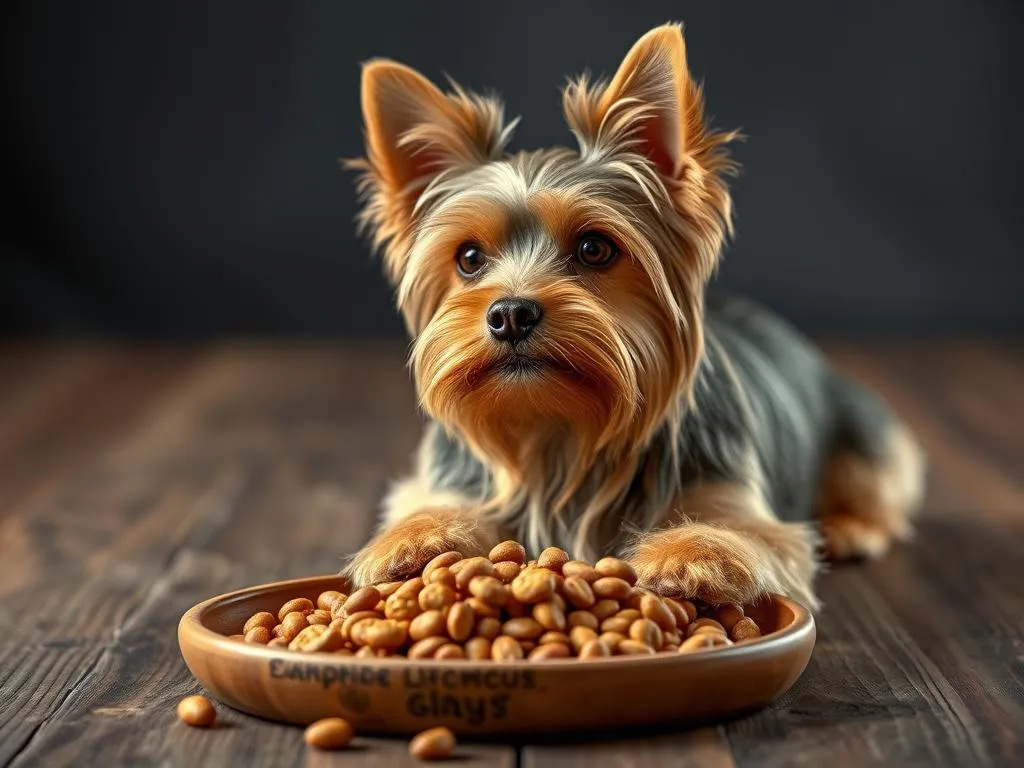
Proper nutrition is crucial for all dogs, but it holds particular significance for Yorkshire Terriers, or Yorkies. These small, spirited dogs have unique dietary requirements due to their size, high metabolism, and susceptibility to certain health issues. Understanding what makes the best dog foods for Yorkies involves recognizing their specific needs and tailoring their diet accordingly.
Understanding Yorkshire Terriers
Characteristics of Yorkies
Yorkshire Terriers are small, typically weighing between 4 to 7 pounds, and stand about 7 to 8 inches tall. Their petite size makes them one of the most popular toy breeds. Despite their small stature, Yorkies are known for their energetic nature and playful demeanor.
However, their size also means they are prone to specific health concerns, including:
- Dental problems: Due to their small mouths, Yorkies often experience dental issues, necessitating a diet that promotes oral health.
- Allergies: Yorkies can be sensitive to certain ingredients, making it essential to choose dog food carefully.
- Luxating patella: This is a common joint problem in small breeds, and proper nutrition can help maintain weight and support joint health.
Nutritional Needs of Yorkies
Balanced nutrition is vital for small breeds like Yorkies. They require a diet rich in high-quality ingredients to support their active lifestyle. Key macronutrients include:
- Proteins: Essential for growth, energy, and muscle maintenance.
- Fats: Provide energy and support healthy skin and coat.
- Carbohydrates: While not as crucial, they offer quick energy and fiber for digestive health.
In addition to macronutrients, specific vitamins and minerals are vital for Yorkies, including:
- Calcium and phosphorus: Important for bone health.
- Omega fatty acids: Promote healthy skin and coat.
- Antioxidants: Support overall health and immune function.
Key Factors in Choosing Dog Food for Yorkies
Age Appropriateness
Different life stages require different nutritional formulations. Puppy food, for example, contains higher protein and fat levels to support growth and development. Adult food is balanced for maintenance, while senior food may focus on joint health and lower calories to prevent obesity.
Ingredient Quality
High-quality ingredients are essential when selecting the best dog foods for Yorkies. Look for:
- Real meat as the first ingredient for quality protein.
- Avoid fillers such as corn and soy, which provide little nutritional value.
- Understand dog food labels to ensure you know what you’re feeding your Yorkie.
Special Dietary Needs
Many Yorkies may experience dietary sensitivities. Key considerations include:
- Allergies or sensitivities: Choose hypoallergenic or limited-ingredient diets.
- Grain-free options: Some Yorkies do better on grain-free diets, while others may not.
- Dental health: Foods formulated to promote oral health can be beneficial for Yorkies prone to dental issues.
Types of Dog Food
Dry Dog Food (Kibble)
Kibble is convenient and often more affordable. Benefits include:
- Dental benefits: Crunchy kibble can help reduce plaque and tartar buildup.
- Long shelf life: Kibble can last longer than wet food.
However, it can be less palatable for some Yorkies. Recommended brands include:
- Royal Canin Yorkshire Terrier Adult: Specifically formulated for Yorkies, it supports dental health and has an appropriate fat content for energy.
- Hill’s Science Diet Small Paws: Offers well-balanced nutrition with high-quality proteins.
Wet Dog Food (Canned)
Wet food can be more appealing and easier to chew. Benefits include:
- Hydration: Provides additional moisture, which is beneficial for overall health.
- Palatability: Often more enticing for picky eaters.
Top recommended brands include:
- Blue Buffalo Homestyle Recipe: Made with real meat and wholesome ingredients, suitable for Yorkies.
- Wellness CORE Grain-Free: High in protein with natural ingredients, catering to Yorkies’ nutritional needs.
Raw Diet
A raw diet consists of uncooked meat, bones, and vegetables. Pros include:
- Natural diet: Closely resembles what dogs would eat in the wild.
- High protein: Supports muscle health.
However, there are cons, such as potential health risks from bacteria. Safety considerations are vital if choosing this option. Trusted raw food brands include:
- Instinct Raw: Offers balanced raw food options for small breeds.
- Nature’s Variety: Provides a variety of raw food products that cater to specific health needs.
Homemade Dog Food
Preparing homemade meals for your Yorkie can ensure quality control over their diet. Benefits include:
- Customization: Tailor meals to meet your Yorkie’s specific needs.
- Ingredient quality: You control what goes into each meal.
Essential ingredients include:
- Lean proteins: Chicken, turkey, or fish.
- Fruits and vegetables: Carrots, peas, and blueberries.
- Whole grains: Brown rice or quinoa.
Simple recipe example:
- Chicken and Rice:
- 1 cup cooked chicken (shredded)
- 1/2 cup cooked brown rice
- 1/4 cup steamed carrots
Mix and serve in appropriate portions!
Top Recommended Dog Foods for Yorkies
Premium Kibble Brands
- Royal Canin Yorkshire Terrier Adult
- Nutritional breakdown: 29% protein, 18% fat.
-
Features: Supports dental health, tailored for Yorkies’ energy levels.
-
Hill’s Science Diet Small Paws
- Nutritional breakdown: 26% protein, 16% fat.
-
Features: High-quality ingredients with antioxidants for immune support.
-
Wellness Small Breed Complete Health
- Nutritional breakdown: 28% protein, 14% fat.
-
Features: Grain-free, with probiotics for digestive health.
-
Merrick Lil’ Plates
- Nutritional breakdown: 38% protein, 16% fat.
-
Features: Real meat as the first ingredient, grain-free options.
-
Taste of the Wild Small Breed
- Nutritional breakdown: 32% protein, 18% fat.
- Features: High protein content with wholesome ingredients.
Best Wet Food Options
- Blue Buffalo Homestyle Recipe
- Nutritional breakdown: 8% protein, 5% fat.
-
Features: Real meat with no artificial preservatives.
-
Wellness CORE Grain-Free
- Nutritional breakdown: 10% protein, 5% fat.
-
Features: High in protein, grain-free, and includes added vitamins.
-
Purina Pro Plan Savor
- Nutritional breakdown: 10% protein, 4% fat.
-
Features: Real chicken as the first ingredient, highly digestible.
-
Royal Canin Veterinary Diet
- Nutritional breakdown: 8% protein, 4% fat.
-
Features: Formulated for specific health needs, including dental care.
-
Nutrish Zero Grain Wet Food
- Nutritional breakdown: 9% protein, 4% fat.
- Features: Grain-free with real meat and no artificial ingredients.
Raw Diet Recommendations
- Instinct Raw Boost Mixers
- Nutritional benefits: High-protein raw pieces to mix with kibble.
-
Safety tips: Always handle raw food with care to prevent contamination.
-
Stella & Chewy’s Freeze-Dried Raw
- Nutritional benefits: Balanced raw diet with no fillers.
- Safety tips: Rehydrate before serving for optimal digestion.
Homemade Food Recipes
- Beef and Sweet Potato Stew:
-
1/2 pound ground beef, 1 cup diced sweet potatoes, 1/2 cup carrots, simmer until cooked.
-
Turkey and Quinoa Bowl:
- 1/2 pound ground turkey, 1/2 cup cooked quinoa, 1/4 cup peas, mix and serve.
Important tips include ensuring all ingredients are dog-safe and consulting with a vet before making significant dietary changes.
Feeding Guidelines and Tips
Portion Control
Understanding portion sizes is critical for maintaining a healthy weight. Recommended serving sizes often depend on weight and activity level. Use the feeding guidelines on the dog food packaging as a starting point, but adjust based on your Yorkie’s individual needs. Regularly monitor their weight to ensure they remain within a healthy range.
Transitioning to New Dog Food
When changing your Yorkie’s diet, gradual transitions are key to avoiding digestive issues. Start by mixing a small amount of the new food with their current food, gradually increasing the new food over a week. Keep an eye out for signs of food intolerance, such as vomiting or diarrhea.
Regular Vet Check-ups
Routine vet visits are essential for monitoring your Yorkie’s health. Your veterinarian can provide personalized dietary advice and help manage any health fluctuations. Regular check-ups ensure your Yorkie remains healthy and thriving.
Conclusion
Selecting the best dog foods for Yorkies is fundamental to their overall health and well-being. With their unique dietary requirements, it’s vital to choose high-quality ingredients that cater to their size, metabolic needs, and health considerations. Always consult with your veterinarian to tailor your Yorkie’s diet to their specific needs, ensuring they live a healthy, happy life. A balanced diet is not just about feeding; it’s about nurturing your furry friend for years to come.









